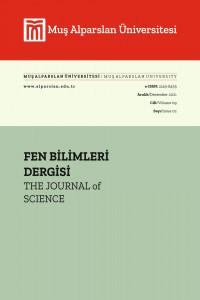Şiddetli Jeomanyetik Fırtınanın Gece Yarısı İyonosfer Üzerindeki Etkisinin ROTI Aracılığıyla İncelenmesi
İyonosferik TEC, ROTI, jeomanyetik fırtına
Investigation of the Severe Geomagnetic Storm Effects on Ionosphere at Nighttime through ROTI
Ionospheric TEC, ROTI,
___
- [1] Astafyeva E., Yasyukevich Y., Maksikov A., Zhivetiev I. Geomagnetic storms, super‐storms, and their impacts on GPS‐based navigation systems, Space Weather. 12, 508-525, 2014.
- [2] Danilov A., Lastovicka, J. Effects of geomagnetic storms on the ionosphere and atmosphere, International Journal of Geomagnetism and Aeronomy. 2, 209-224, 2001.
- [3] Skone S., Cannon, M. E. Ionospheric effects on differential GPS applications during auroral substorm activity, ISPRS Journal of Photogrammetry and Remote Sensing . 54, 1995.
- [4] Noja M., Stolle C., Park J., Lühr H. Long‐term analysis of ionospheric polar patches based on CHAMP TEC data, Radio Science. 48, 289-301, 2013.
- [5] Prikryl P., Ghoddousi-Fard R., Kunduri B.S. R., Thomas E. G., Coster A. J., Jayachandran, P. T., Spanswick E., Danskin, D. W. GPS phase scintillation and proxy index at high latitudes during a moderate geomagnetic storm, Annales Geophysicae. 31, 805-816, 2013.
- [6] Prikryl P., Jayachandran P.T., Mushini S.C., Richardson I. G. High-latitude GPS phase scintillation and cycle slips during high-speed solar wind streams and interplanetary coronal mass ejections: a superposed epoch analysis, Earth, Planets and Space. 66, 62, 2014.
- [7] Cherniak I. Zakharenkova, I. Dependence of the high-latitude plasma irregularities on the auroral activity indices: a case study of 17 March 2015 geomagnetic storm, Earth, Planets and Space. 67, 151, 2015.
- [8] Fejer B.G., Scherliess L., Paula E.D. Effects of the vertical plasma drift velocity on the generation and evolution of equatorial spread F, Journal of Geophysical Research: Space Physics. 104, 19859-19869, 1999.
- [9] Rezende L.F.C.D., Paula E.R.D., Batista I.S., Kantor, I.J., Muella M.T.D.A.H. Study of ionospheric irregularities during intense magnetic storms, Revista Brasileira de Geofísica. 25, 151-158, 2007.
- [10] Cherniak I., Zakharenkova, I. High-latitude ionospheric irregularities: differences between ground-and space-based GPS measurements during the 2015 St. Patrick’s Day storm, Earth, Planets and Space. 68, 136, 2016.
- [11] Oladipo O.A., Schüler T. Magnetic storm effect on the occurrence of ionospheric irregularities at an equatorial station in the African sector, Annals of Geophysics. 56, 0565, 2014.
- [12] Arikan F., Nayir H., Sezen U., Arikan O. Estimation of single station interfrequency receiver bias using GPS‐TEC, Radio Science. 43, RS4004, 2008.
- [13] Nayir H., Arikan F., Arikan O., Erol, C. Total electron content estimation with Reg‐Est, Journal of Geophysical Research: Space Physics. 112, A11313, 2007.
- [14] Sezen U., Arikan F., Arikan O., Ugurlu O., Sadeghimorad A. Online, automatic, near‐real time estimation of GPS‐TEC: IONOLAB‐TEC, Space Weather. 11, 297-305, 2013.
- [15] Jacobsen, K. S. The impact of different sampling rates and calculation time intervals on ROTI values, Journal of Space Weather and Space Climate. 4, A33, 2014.
- [16] Pi X., Mannucci A. J., Lindqwister U. J., Ho C. M. Monitoring of global ionospheric irregularities using the worldwide GPS network, Geophysical Research Letter. 24, 2283-2286, 1997.
- [17] Liu X., Yuan Y., Tan B., Li M. Observational analysis of variation characteristics of GPS-based TEC fluctuation over China, ISPRS International Journal of Geo-Information.5, 237, 2016.
- [18] Oladipo O.A., Schüler T. Equatorial ionospheric irregularities using GPS TEC derived index, Journal of Atmospheric and Solar-Terrestrial Physics. 92, 78-82, 2013.
- [19] Wautelet, G.: Characterization of ionospheric irregularities and their influence on high-accuracy positioning with GPS over mid-latitudes, Ph.D. Thesis, Université de Liège, Liège, Belgique, 2013.
- ISSN: 2147-7930
- Yayın Aralığı: Yılda 2 Sayı
- Başlangıç: 2013
- Yayıncı: Muş Alparslan Üniversitesi
Mustafa Furkan KESKENLER, Eyüp Fahri KESKENLER
Hülya DURMUŞ, Nilay ÇÖMEZ, Canser GÜL, Melis YURDDAŞKAL
G=S(1), G=S(2) ve alt Grubları için G- Yörüngeler
Selçuk SAĞIR, Ramazan ATICI, İskender DÖLEK
Bir Haptik Robot için Arayüz Tasarımı ve Performans Analizi
Çok Duvarlı Karbon Nanotüplerin Su Bazlı Sondaj Çamurlarına Etkisi
POM Temelli Katalitik Membran Kontaktörün Hazırlanması ve Karakterize Edilmesi
Ali Kemal TOPALOGLU, Yılmaz YILDIRIM
Değişken Gecikmeli Stokastik Doğrusal Geçiş Sistemleri İçin Kısıtlı Optimal Kontrol Problemi
